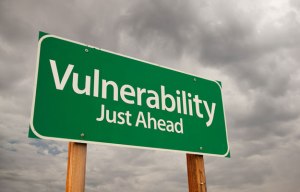I thought that might get your attention!
But, it’s not what you are thinking. What I had was a vulnerability hangover.
Let me explain.
On Sunday, I had the opportunity to speak at my church. It was a message of encouragement but within the message I told the entire congregation about the fact that my depression had gotten so bad last year that I decided to treat it with medication. It was pertinent to the conversation because I was talking about shame – something I felt a great deal of and had to fight off. I felt good about sharing because even though I knew it would be uncomfortable, I believed it would help someone.
It went well and many people thanked me for my transparency. On Sunday night, I felt like I had accomplished what I set out to do.
Then Monday came.
I woke up and thought, “I can’t believe I shared such personal details with 3 services worth of people not to mention those who may watch the video.” I was experiencing a vulnerability hangover. I didn’t make that up. It is a term coined by Brené Brown, researcher of such topics as courage, vulnerability, authenticity, empathy and shame. Brené explains that a vulnerability hangover is “the feeling that sweeps over us after we feel the need to connect… and we share something deeply meaningful. Minutes, hours, or days later, we begin to feel regret sweep over us like a warm wave of nausea.”
I’m happy to say that because I have been sharing bits and pieces of my story for a while now, my hangover was not too bad. I was able to shake it off pretty quickly having learned these 3 things.
#1 It’s worth it.
The discomfort of vulnerability is worth it when you weigh it against the value of connection. Connection, true connection is what people who are in need are looking for. It doesn’t help them to see someone who acts like they have it all together all the time – it only adds to their shame and impedes their ability to open up and share themselves. When true connection is made, we share. When we share we heal.
#2 It’s not the critic who counts. (thank you, Theodore Roosevelt!)
At the heart of the vulnerability hangover is the fear of being judged. Since depression is classified as a mental illness I battle the fear of being defined by my struggle. There are people who will disagree with how I choose to handle and overcome depression but in the end it is not those people who I necessarily feel drawn to connect with. I have come to terms with the reality that there will be those who may not understand or have a different opinion than I do. I have resolved that I answer only to the One who has called me to share my story in order to help others.
#3 It’s not about me.
We live in a me-driven world. As a Christian and follower of Jesus, I want to live as He lived. He lived His life entirely for others. Notice I said I WANT to live as He lived. That doesn’t mean I always do, by any means. But when I am feeling exposed and vulnerable I remember that in order to live the way I claim to want to live, it requires dying to myself and living for a greater cause. Ironically, it ends up being the best thing for ME. It is where I derive true joy and peace – so in the end it sort of is about me. But that’s how God works. The more we pour ourselves out on behalf of others the more he pours joy and peace into us. It’s a pretty good deal.
Final thought on vulnerability, again from Brené Brown. (can you tell I love her and her work?)
Vulnerability sounds like truth and feels like courage. Truth and courage aren’t always comfortable, but they’re never weakness.
Amen.
Have you ever experienced a vulnerability hangover after taking a courageous step to share a part of yourself? I’d love to hear about it ~ please leave a comment!

